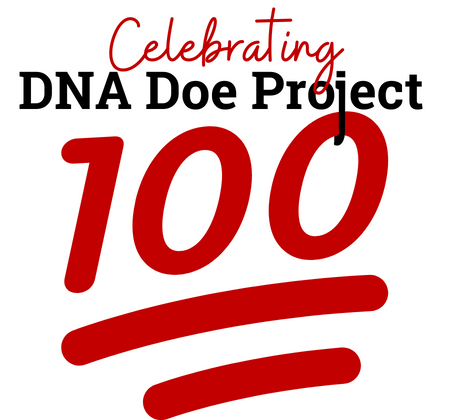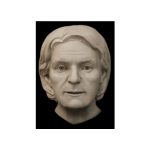
Our teams of dedicated, volunteer Investigative Genetic Genealogists have successfully identified 100 Jane and John Does, returning them to their families and communities.
In our 5th anniversary year, we are celebrating our 100th identification. And that’s only the beginning. We’re on a mission to restore the names to the unidentified human remains in every community. There is so much more work to do.
Our unique non-profit model makes it possible for even the toughest cases to be tackled – if there is DNA, there is hope. We never give up on a case, whether it takes 10 hours or 1000 hours to solve. Generous corporate and individual donors ensure that we have the resources to back up this commitment by providing funding for the lab work, secure infrastructure, and professional staff who support more than 80 volunteer investigative genetic genealogists.
Our research models, methodologies, and processes have helped set the standard for how work is done across our industry. We collaborate closely with law enforcement agencies, communities, and individuals so that every investigation has the resources it needs to move forward. More and more agencies seek to partner with us to identify the people who have died in their communities without their names.
We already have the next 100 cases in our pipeline and we are growing our capacity to solve them with your support.
We’re just getting started.
Join the Celebration with a Gift Today
Our stakeholders share the impact of our work:
Cases involving Jane and John Doe unidentified remains may seem like cases of forgotten people. In reality, these people, disconnected from their names and families, are cared for by unsung heroes who shoulder a heavy burden until the case is resolved.
Families and Communities
I just wanted your team to know that she was a person, a mother. She had feelings and value, and I appreciate your team giving her the care and respect that she deserved, that she rarely had in life. Thank you for giving her her name back.
a Daughter
While she is not forgotten by some, she is still unknown. She deserves a name, to tell the story of who she is, and what happened to her. It is so sad to go to see her and she is just there with no one knowing who she is, what happened, who is responsible, or even if someone is looking for her. She is loved by those who know about her.
a Stranger who visits her grave
Our Partners
I was the Detective handling the Lyle Stevik suicide in 2001. I followed every lead I could, and with the amazing help of the DNA Doe network, he was given his real name. I took part in the exhumation, and lifted his body back out of the ground. He was cremated, and his ashes were given to his parents after 16 years.
Lane Youmans
When we are born, the first thing we receive is a name, and that should be the one thing we get to keep when we die. Everyone is someone’s child and has family, no matter what path their life has followed. I feel that we’ve become almost caretakers for these lost souls until they can be returned to their family.
Stuart Somershoe
Our Volunteers
While it can be difficult to put into words, volunteering with the DNA Doe Project is truly an unforgettable experience that is rewarding, impactful, eye-opening and heart-wrenching all at the same time. As a result of putting so much time into researching families and getting to know the unidentified, we often feel a sense of connection with them as a result of doing so. In spite of the fact that it is somewhat bittersweet to know that once their names are restored their loved ones will be notified of their passing, it is also comforting to know that they will finally have some answers to the questions that they have been wondering about for so long.
Tracie Boyle
volunteer since 2018
The moment we learn the name is bitter sweet. Working for so long to find it it’s a relief and exciting but knowing that in giving a family closure we are also taking away any hope that was left can be sad. It seems best to have the truth overall but even if it’s been decades it still includes sadness.
Stacey Mitchell
volunteer since 2017
I show up because it’s a way to give back and know that I am doing something good in the world in a very real, tangible way. I show up because I love the actual work. I show up because I truly feel I am meant to. I was a pretty lost soul before genetic genealogy entered my life, now I couldn’t be happier, it is my life’s work, and I consider myself pretty lucky to have found that!
Rachel King
volunteer since 2018
These have never been, or just happen to be “cases” to me. They’re human beings who have lived life— they have laughed, cried, and the people they’ve interacted with over the years have felt a noticeable absence in the wake of their disappearance. Wondering where they went, tirelessly searching, exhausting any and all efforts to ensure they aren’t forgotten.
Bryan Worters
volunteer since 2022



